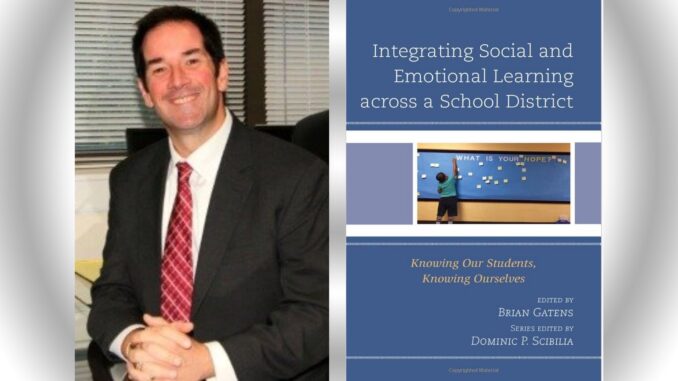
EMERSON—The Emerson Public School District now serves as a model for other school districts in an ongoing book series.
Emerson’s teaching approach of social-emotional learning — a set of principles for students to develop self awareness, self control and interpersonal skills for their careers and life — appears in “Integrating Social and Emotional Learning across a School District: Knowing Our Students, Knowing Ourselves,” edited by Brian P. Gatens, Ed.D, superintendent of schools.
The title is part of the five-book series Teaching Ethics across the American Educational Experience.
Gatens’ book, which offers a broad overview of the district for its readers and draws out what makes it special, was written by Gatens and former Emerson resident Dominic P. Scibilia over the course of nearly two years from the summer of 2017.
It was released this past June after production delays stemming from the pandemic.
Rowman & Littlefield Publishers says, “With chapters from experienced teachers and school and district leaders, this text provides a wealth of practical strategies and inspirational guidance on incorporating social-emotional and ethical learning across a district and educational community.”
Scibilia, who is the creator and main editor behind the series, told Pascack Press last week, “A person reading this book would walk away with a sense that Emerson is a community that is very supportive of their educational system.”
He said, “They’ll have a clear understanding of the school’s commitment to really help each student develop academically, socially and emotionally. It’s partly focused on students’ journeys towards coming to know who they are, beginning to get a sense by the time they get through with high school what they might want to give to the world.”
Being in education since 1990 as a teacher of social ethics, Scibilia said he realized that there was “more going on” in the classroom that expanded beyond his students engaging in a particular subject.
“In order to help them understand why they were learning what they were learning, and have that connect to their real lives, I had to understand the whole student, what they feel and what they see the way they do,” Scibilia said. “It is significant for a teacher and students themselves.”
With his own experience with social-emotional learning, Scibilia then came up with the idea to write books on the approach, enlisting Rowman & Littlefield as the publisher.
He said that the final book in the series, “Teaching Ethics: Instructional Models, Methods, and Modalities for University Studies,” is forthcoming in September.
For “Knowing Our Students, Knowing Ourselves,” Scibilia met individually with the book’s contributors — Gatens, Director of Curriculum Alice Opperman, and school principals and teachers — on a monthly basis to guide them in developing journals of their experiences in Emerson and then write for the publication.
“I closely followed what was happening with the Board of Education and education issues in the town,” said Scibilia, referencing between 2017 and 2019 when he lived in Emerson.
The introduction includes a production timeline, part of which was recorded March 14, 2018: “It has been a month since the shootings and killing of seventeen adults and students at Marjory Stoneman Douglas High School in Parkland, Florida. The front page of the New York Times frames the infancy narrative of the student social movement #Never Again. Like many student movements from around the world (from Colombia, Mexico City, Taiwan, and to the call for public education in Valparaiso, Chile) Parkland High School students call for social change.”
The editors say in part, “Teaching Ethics across the American Educational Experience gives us pause to consider the moral seeding underway throughout American schools. Indeed, students are learning how to distinguish right from wrong, to engage reason, emotion, and imagination when acting as moral agents.”
Scibilia said, “In the area of ethics across the country, there is an openness to looking at teaching ethics of the whole person — that means involving their emotions, intellectual abilities, intuition and imagination.
“There’s a good matchup between what was happening in Emerson and what they were beginning to do to what was happening on a national scale.”
During that time, the local school board had completed a strategic plan — including building changes, adopting a global learning focus and implementing social-emotional learning — for the next five years, according to Scibilia.
Gatens told Pascack Press, “The most noticeable impact regarding our students in regards to our social-emotional learning work is that they now have the vocabulary and ability to say what they are thinking and feeling while they are living their day to day lives.”
He said, “Experience has shown that when offered the ability to think about and verbalize their internal thoughts they now have the ability to consider the thoughts, feelings and actions of others.”
Over the next several months, Gatens will be presenting the book at regional and state conferences.
“All of the ideas in the book have been directly applied to our students and their school experience,” Gatens said. “The need to know both oneself as well as take others into consideration is necessary for any member of society, and we take pride in how strongly our students have responded to this vital work.”
